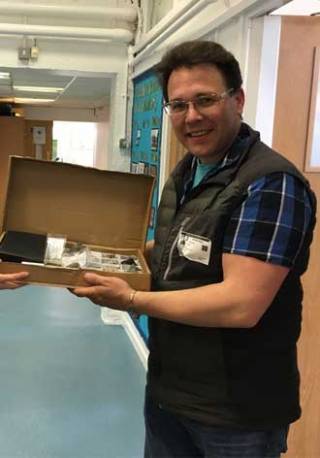Geochemistry, geobiology, biogeochemistry, micro-palaeontology, organic geochemistry, chemical sedimentology, sedimentary petrology, biosignatures, astrobiology, exobiology, correlative microscopy
Professor in Precambrian Biogeochemistry and Exobiology

Appointment: | Room: |
|---|---|
| Professor | 4.C4 Center for Nanotechnology |
Courses Taught: | |
| GEOL0001: Earth Materials | |
| GEOL0014: Geoscience Report | |
| GEOL0059: Origins of Life and Exobiology | |
Research Group(s): | |
| Precambrian Research | |
| The London Geochemistry and Isotope Centre (LOGIC) | |
| The Centre for Planetary Sciences | |
Email Address: | Telephone Number: |
| d.papineau@ucl.ac.uk | 020 7679 3404 (33404) |
Research Summary
My main research interests are aimed at understanding the origin and evolution of life during the first four billion years of Earth history in order to predict what might be found on other planets and planetary bodies with liquid water and volcanism. I am particularly interested in the following scientific problems:
- The origin of life from prebiotic geochemical evolution to the first microbial life on the early Earth.
- Establish robust approaches to distinguish between biosignatures and the signatures of abiotic processes in sedimentary and volcanic rocks.
- Determine how ancient microbial communities affect or are affected by the biogeochemical cycles of C, N, S, and P.
- Understand the oxygenation of the atmosphere and oceans, and how this led to the rise of increasingly complex life forms in the Paleoproterozoic and Neoproterozoic.
I approach these problems primarily using ‘correlative microscopy’ to study polished thin sections of rocks such as stromatolites, banded iron formations, cherts, black shales, phosphorites, concretions, and botryoids. I also use bulk geochemistry techniques to measure stable isotopes and trace elements as tracers of processes and I perform benchtop geochemical experiments that produce patterns comparable to those seen in sedimentary rocks.
I believe that a solution to the above scientific problems will help to unify the disciplines of Earth Sciences and to give the necessary basis to explore other ancient planetary surfaces for biosignatures. The dream of finding extra-terrestrial life is a ‘raison d’être’, an outcome of the evolution of consciousness on this planet, and potentially a way to bring peace on Earth.
- Correlative Microscopy
This approach consists in using several microscopy techniques on the same target to characterise them as completely as possible. These microscopy techniques include: optical microscopy, micro-Raman spectroscopy, Fourier Transform InfraRed micro-spectroscopy (FTIR), Scanning Electron Microscopy (SEM), Electron Probe Micro-Analysis (EPMA), Focused Ion Beam (FIB), Transmission Electron Microscopy (TEM), Energy Dispersive Spectroscopy (EDS), Secondary Ion Mass Spectroscopy (SIMS), Nanoscale Secondary Ion Mass Spectrometry (NanoSIMS), Time-of-Flight Secondary Ion Mass Spectrometry (ToF-SIMS), synchrotron-based Scanning Transmission X-ray Micro-spectroscopy (STXM), He-Ne microscopy, and Atom Probe Tomography (APT).
The integration of these techniques to analyse microscopic mineral assemblages associated with organic matter in old sedimentary rocks provides complementary and partly redundant geochemical analyses of elemental, isotopic, and molecular analyses. In turn, these results yield a complete compositional make-up to achieve robust datasets and interpretations to answer the challenging questions about the origin and early evolution of life. They are also well-suited to analyse geological specimens that are being returned from the Moon and soon from Mars.- Research Projects Opportunity
To inquire about projects (B.Sc., M.Sc., Ph.D., Postdoctoral, and Visiting Scholar), please e-mail me directly to discuss your interests. Some examples are given in the Astrobiology tab of the Centre for Planetary Sciences webpage or London NERC DTP Doctoral Training Programme).
 Close
Close

